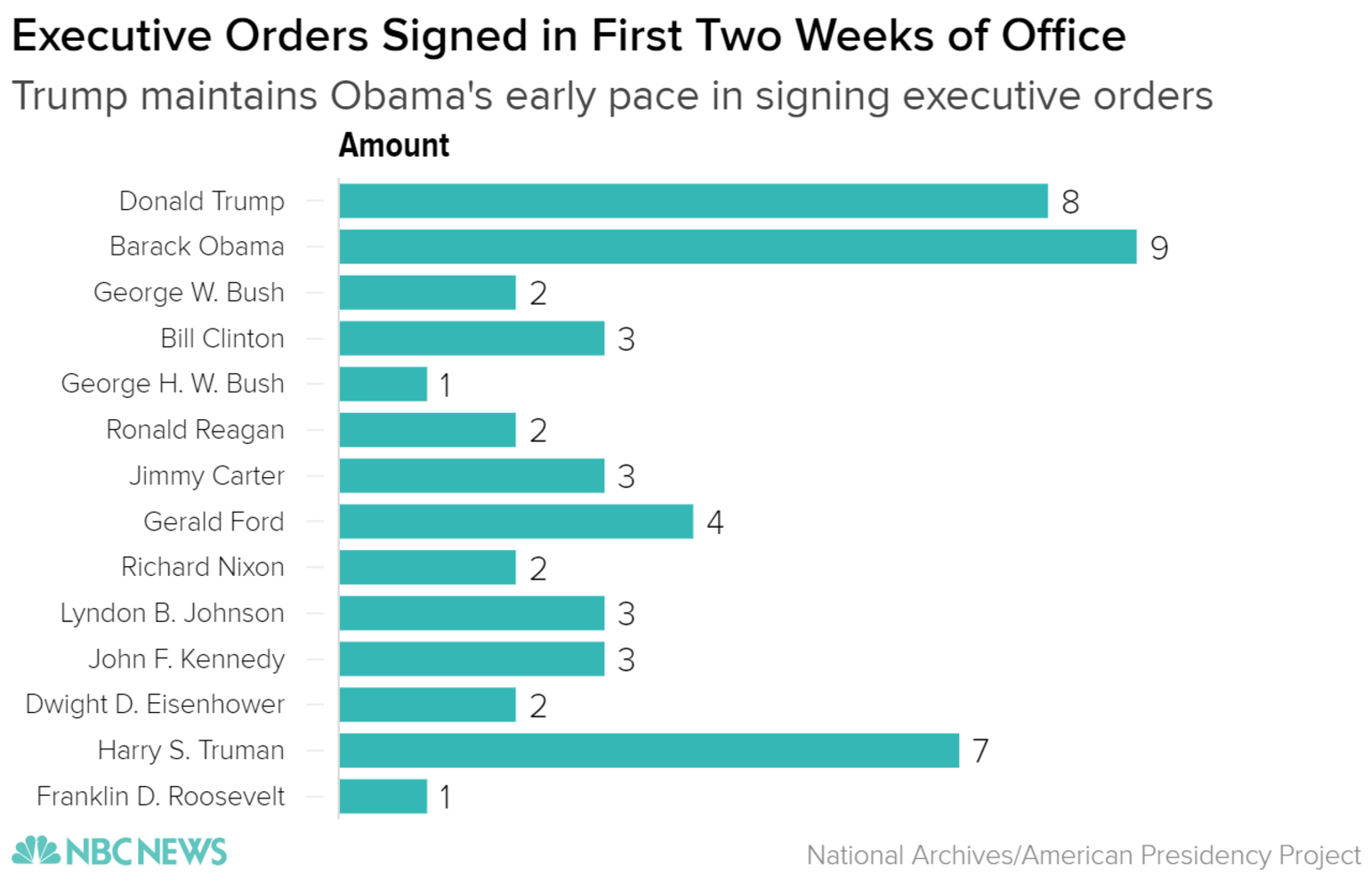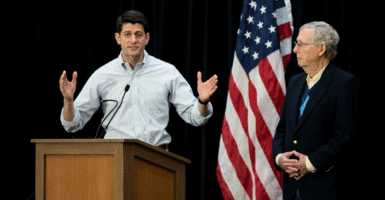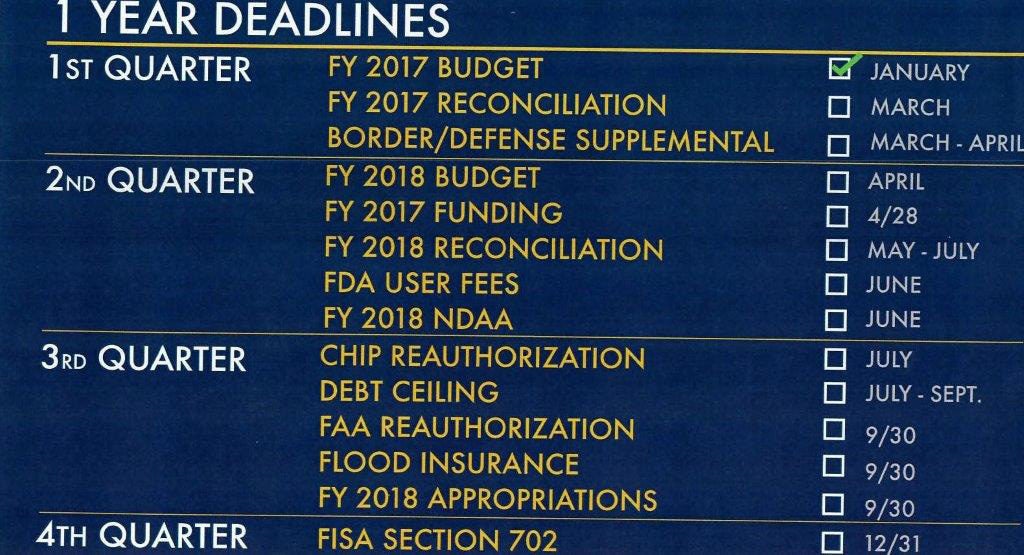When the 115th Congress arrived Jan. 3, the majority had an ambitious agenda. With Republicans in control of the House and Senate, and soon the White House, it was the first time in 10 years they could advance their policy agenda unobstructed by Democrats.
Yet a month later, the GOP-led Congress has produced just three bills for President Donald Trump to sign: a waiver allowing retired Marine Gen. James Mattis to serve as defense secretary, a joint resolution repealing the Obama administration’s stream protection rule, and another resolution reversing a Securities and Exchange Commission rule pertaining to energy companies.
Republicans have delayed action on campaign promises such as repealing Obamacare and defunding Planned Parenthood.
In the Senate, Republicans are struggling to overcome Democrat delays in confirming Trump’s Cabinet nominees.
Senate Majority Leader Mitch McConnell said those delays have made the Senate’s job unnecessarily difficult. In a statement provided to The Daily Signal, the Kentucky Republican said:
Democrat obstruction has reached such extreme levels that the smallest number of Cabinet officials have been confirmed in modern history at this point in a presidency. It’s a historic break in tradition, a departure from how newly elected presidents of both parties have been treated in decades past.
The result is growing frustration among conservatives that the GOP isn’t moving quickly enough to capitalize on Trump’s first 100 days and the limited window of opportunity in Washington.
This week, for instance, the House will work just two days due to a Democrat retreat. Last month, Republicans decamped for three days for their own retreat in Philadelphia.
Last year, when House Speaker Paul Ryan outlined his “A Better Way” agenda, the Wisconsin Republican billed it as the GOP’s blueprint for the coming year.
“This is our game plan for 2017,” Ryan told reporters in October.
A month later, after Trump’s victory in November, a jubilant Ryan boasted about the forthcoming “dawn of a new unified Republican government.”
“If we are going to put our country back on the right track, we have got to be bold and we have to go big. This country is expecting absolutely no less,” Ryan said in November. “We want to make sure we hit the ground running in January, so we can deliver on the new president’s agenda.”
In the days ahead, we'll work with President-elect Trump's transition team to lay out an ambitious path for 2017. pic.twitter.com/FV2mdy3oM6
— Paul Ryan (@SpeakerRyan) November 17, 2016
In December, Ryan told CBS News’ “60 Minutes” that “the first bill we’re going to be working on is our Obamacare legislation.”
And while the House took the first step Jan. 13 by approving a resolution establishing the framework for repeal, lawmakers missed their Jan. 27 deadline to draft the Obamacare repeal legislation.
A senior congressional aide told The Daily Signal that Republicans are determined to “provide Obamacare relief for struggling Americans.”
“The Senate began consideration the first day of the new congressional session,” the aide said of the drive to repeal and replace Obamacare, adding:
After [the Senate passed] that resolution, which is the start of the repeal process, the House passed the resolution immediately upon receiving it. House committees are now writing the reconciliation [bill] to repeal and potentially even include some replace.
Ryan also said defunding Planned Parenthood would be included in the budget reconciliation package, just as it was in a 2015 bill the Republicans passed and President Barack Obama vetoed early in 2016.
>>> Ryan: Reconciliation Bill Will Block Planned Parenthood Funding
The latest timeline, according an internal House schedule leaked last week, suggests the reconciliation bill could be considered in March—although it could slip until April.
Congress’ lack of progress on the Obamacare repeal and Planned Parenthood defunding stand in contrast to the activity of the 111th Congress during Obama’s first weeks in office.
In 2009, Obama signed into law three significant bills passed by the Democrat-led Congress. They included the American Recovery and Reinvestment Act, a $787 billion economic stimulus package; the Lilly Ledbetter Fair Pay Act, which proponents said would end pay discrimination against women; and the Children’s Health Insurance Program Reauthorization Act, which provided states with new funding and programming for children’s health care coverage through Medicaid.
Congress introduced each bill either right before or soon after Obama was sworn into office; Obama signed them within his first 36 days.
Congress passed the Lilly Ledbetter bill Jan. 27, the children’s health bill Feb. 4, and the stimulus package Feb. 13.
So far in the 115th Congress, lawmakers passed the Mattis waiver, approved a resolution undoing requirements for coal mining operations, and approved another resolution loosening restrictions on the extraction of natural resources.
In his first two weeks as president, Trump has kept busy despite the lack of congressional activity. He signed eight executive orders, including one that begins the process of dismantling Obamacare.

The budget reconciliation bill passed by Congress in 2015 repealed Obamacare and defunded Planned Parenthood. Although that bill could not repeal the entirety of Obamacare due to Senate rules, it could dismantle a large portion.
>>> In Repealing Obamacare, Congress Should Look to the 2015 Reconciliation Bill
Rachel Bovard, a former Senate aide who is director of policy services at The Heritage Foundation, said Congress could have presented a repeal bill to Trump on Jan. 20, the day he took the oath of office.
“Congress has been a disappointment so far, considering the fact that there is unified control of the government,” Bovard told The Daily Signal. “Congress could have had an Obamacare repeal bill on Trump’s desk at 12:01 p.m. on Inauguration Day, especially if they’d used the 2015 repeal bill that passed both Houses.”
“There is no excuse for the lack of action,” she added. “And, indeed, by delaying it, they’ve allowed the debate to get muddled, slowed the momentum considerably, and in doing so made the task that much harder.”
With midterm elections coming Nov. 6, 2018, some conservatives argue that Republicans have no place to hide.
“The Washington, D.C., Republicans are out of excuses,” Drew Ryun, national director of the Madison Project, a conservative political action committee, said in an email to The Daily Signal. Ryun added:
There are no more electoral goal posts to move. They have the House, the Senate, and with Trump in the White House. For years they have campaigned on the promises of repealing Obamacare and defunding Planned Parenthood.
Unfortunately for them, their inaction is proving two things: They may really be a party without ideas as well as one that pays lip service to its base with no intent of action. This is a dangerous position for them to be in, with midterms just around the corner.
This story was updated to include additional quotes from Ryan and information about Trump’s executive orders.
































